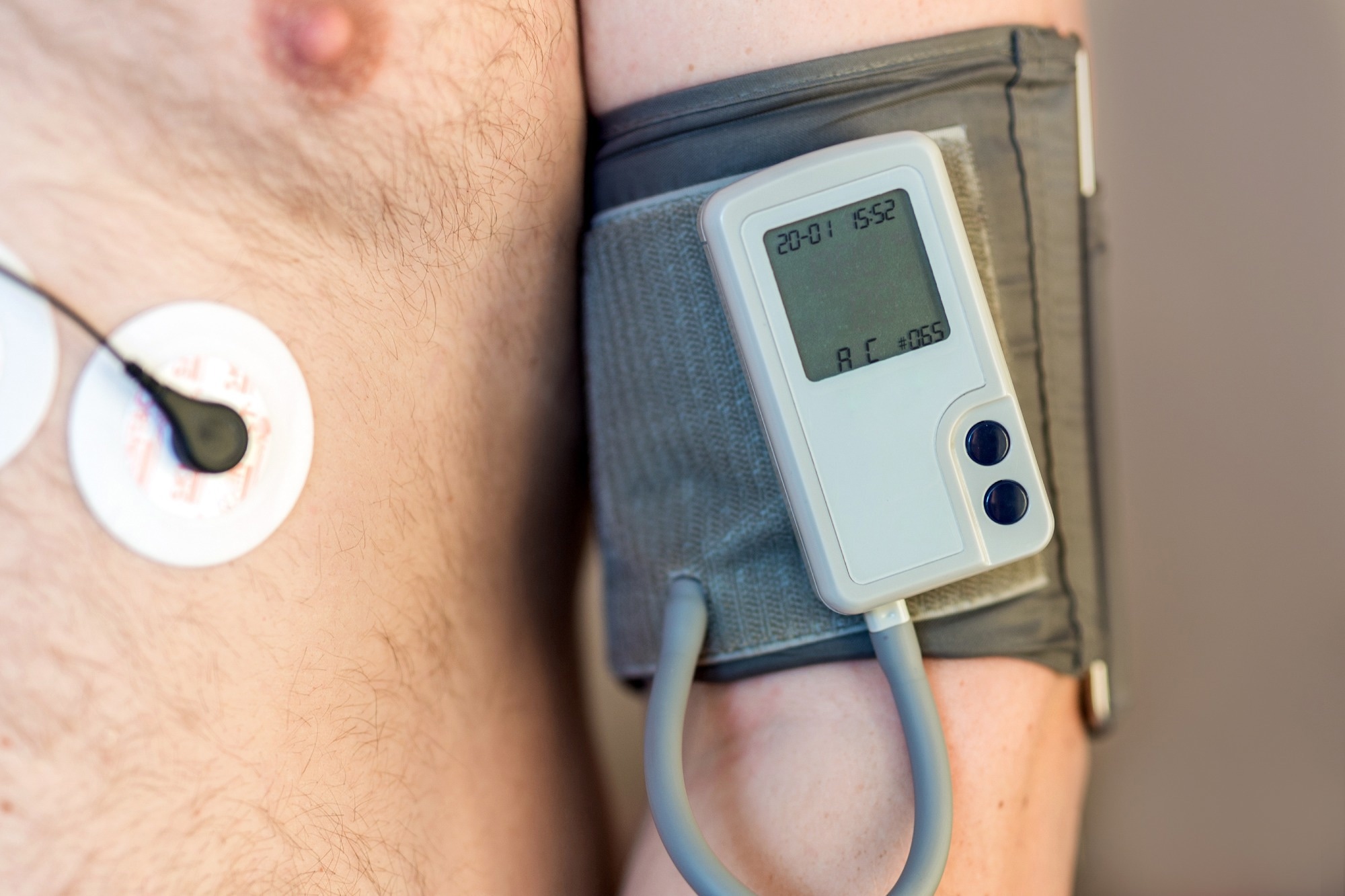Their results indicate that a high proportion of processed foods in the diet positively correlates with increased blood pressure variability and extreme nocturnal dipping.
In contrast, unprocessed and minimally processed food consumption reduced blood pressure fluctuations between day and night.
 Study: Food consumption by degree of processing is associated with nocturnal dipping and blood pressure variability: The ELSA-Brasil study. Image Credit: Gorloff-KV/Shutterstock.com
Study: Food consumption by degree of processing is associated with nocturnal dipping and blood pressure variability: The ELSA-Brasil study. Image Credit: Gorloff-KV/Shutterstock.com
Hypertension and cardiovascular health
Hypertension (HTN) is a global health problem estimated to affect 31.1% of humans and is characterized by a sustained increase in blood pressure (BP). Research has found that HTN is the primary cause of 50% of strokes and coronary heart disease worldwide.
It has been linked to non-modifiable factors like genetics and age and modifiable ones like lifestyle and dietary choices.
Of the many tools available to measure blood pressure and HTN, ambulatory blood pressure monitoring (ABPM) is regarded as the most accurate and informative. Unlike its snapshot-recording counterparts, ABPM can measure and record daily changes.
Researchers can thus use ABPM to evaluate nocturnal BP dipping, morning BP surge, and BP variability, all of which have been found to predict cardiovascular risk accurately.
Previous research has attempted to assess the relationship between food processing and general health. NOVA, a system of food classification based on the degree of processing, is a valuable tool for these studies; however, the association between food processing and HTN remains confounded.
The present study represents the first utilization of ABPM data within the NOVA framework to elucidate the influence of processed food consumption on cardiovascular health.
About the study
In the present study, researchers collected ABMP measurements from participants from the Brazilian Longitudinal Study of Adult Health (ELSA-Brasil). Of the 1,660 participants who undertook ABMP measurements, 845 were considered ineligible and excluded from analyses.
The 815 individuals included in the study were between the ages of 35 and 70 years and were evenly divided between male (49.3%) and female (50.7%) participants.
Researchers collected ABPM data every 20 minutes during the daytime hours (6 a.m. to 11 p.m.) and every 30 minutes during the night (11 p.m. to 6 a.m.). This data was supplemented by a multidimensional food frequency questionnaire (FFQ) in which the participants' food and beverage consumption over 12 months were recorded.
The participants additionally maintained and provided a diary containing sleep and wake-up timings. Scientists used this data to estimate BP variability, nocturnal dipping, and preawakening morning surge.
Food consumed was categorized into three types based on the NOVA classification standard – processed foods (PF), unprocessed/minimally processed foods and culinary ingredients (U/MPFCI), and ultra-processed foods (UPF).
PFs comprised cheeses, alcohol, and bread; U/MPFCI included fruits, vegetables, butter, eggs, and rice; and UPF comprised cakes, pizzas, and instant noodles.
The percentage of each food category in the respondents' diets (as percentages) was used as the raw data for analyses using generalized linear models (GLMs).
Study findings
Most participants were self-declared white individuals between 45 and 54 years old. Most were highly educated at the master's or higher level and belonged to the highest Brazilian income tertile.
Overall physical activity in participants was low, with only 28% of them partaking in moderate to high levels of physical activity. Binge drinking, defined as more than five alcohol doses within 2 hours, multiple times per month, was prevalent in 16.2% of participants.
Genetic and environmental predispositions to HTN were found in many participants, with 70% having a family history of HTN and 31% being on antihypertensive drugs during the study duration.
The proportion of food consumption among participants was the highest in U/MPF&CI (63.1%), followed by UPF (24.8%), with PF (10.8%) being the least consumed, in line with previous estimates. Male and binge-drinking participants consumed more PF than the other sampled individuals.
Analyses could not reveal associations between the category of food consumed and morning BP surge. In contrast, high consumption of PF was correlated with higher BP variability and a higher probability of extreme nocturnal BP dipping.
Adjusting for confounding variables, including age, sex, race, education, genetic history, or income, did not alter the statistical validity of these results.
A possible explanation for this positive association is the nutritional composition of these foods since in the manufacturing process of PF causes an eventual loss of water, in addition to the addition of sugar, oil, and, mainly, sodium, recognized as a risk factor for the increase of BP and HTN, transforming the original food into a source of nutrients that are associated with worse health outcomes."
Since BP variability has been shown to independently predict cardiovascular disease and mortality, these results are essential in helping inform humanity of the benefits of consuming U/MPF&CI over PF.
While ABPM is widely accepted as the most accurate tool to measure blood pressure, its major limitation lies in the expenses associated with its deployment, and future studies with large sample sizes might need to account for this demerit early in their study design.
Conclusions
This study presents the first evidence that high consumption of processed foods correlates with heightened blood pressure variability, especially during nocturnal hours. This implies the demerits of PF consumption and reinforces the importance of lifestyle and diet choices in cardiovascular health.
Our results also indicated that, contrary to expectations, the consumption of UPF was inversely associated with the nondipping pattern and extreme dipping."
The authors could not adequately explain this confound, which might pave the path to future research on ultra-processed food and help introduce novel processing techniques that retain food's beneficial properties.